#sankta ursula
Text
It was never elaborated on in the show so i must mention it here. Aleksander has siblings. I think most of the people in this fandom know this anyway but this is for those who don’t.
Baghra didn’t just happen to have one child who inherited her powers off the bat. She had been trying to have a child for one, maybe two, reasons, and they were that she was 1. bored 2. wanted a child with her powers so she could basically control them too.
She had many kids who didn’t have her powers, and abandoned them, until she had Aleksander, who she kept (and very obviously abused.)
I see posts saying how she’s such a girlboss and a good mother for some reason, but a woman who abandons all the children who aren’t useful to her, and manipulates and abuses the one that is, is neither of those things.
#special shout out to Ulla also. She’s the only other child of Baghra who was named and she’s half fish.#i love ulla though#shadow and bone#grishaverse#baghra morozova#anti baghra#anti baghra morozova#aleksander morozova#the darkling#ulla morozova#sankta ursula
284 notes
·
View notes
Text
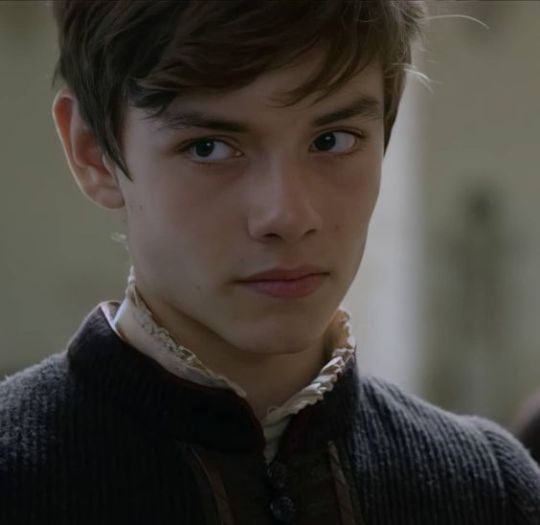
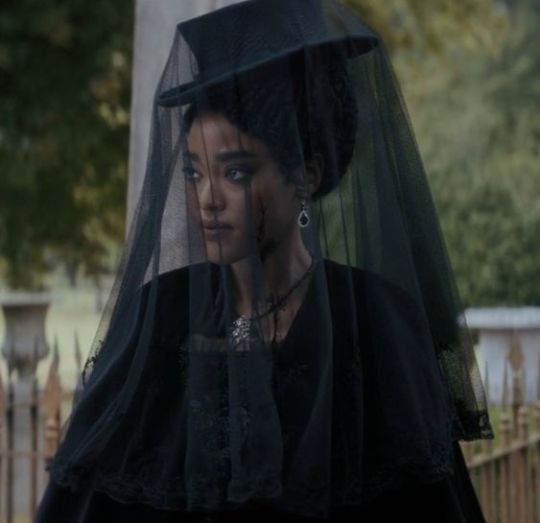
Thinking about Shadow Summoner Ulla & her little brother, Aleksander.
Baghra trying to send Ulla away so she can properly shape her youngest to become exactly who she wants him to be, but in order to do that she must be the only one in his life... But Ulla knows her mother (eldest daughter syndrome) and refuses to let her brother suffer in her hands like she suffered.
Aleksander growing up with his big sister and finally knowing love and acceptance. Ulla becoming the first one to take the Darkling name and Aleksander following her footsteps...
#the darkling#ulla morozova#aleksander morozov#aleksander morozova#grishaverse#shadow and bone#pro darkling#pro aleksander morozova#sankta ursula#sankta ursula of the waves
33 notes
·
View notes
Text




She is water. Powerful enough to drown you. Soft enough to cleanse you. And deep enough to save you
Ulla Morozova * Sankta Ursula
#doddles by cavalierfou#ulla morozova#fc: gugu mbatha raw#morozova family#shadow and bone#grishaverse#bookverse#leigh bardugo#the darkling#grishaverseedit#sankta ursula#ullamorozovaedit#my edits#grishaverseeditingweek#minimmakes
42 notes
·
View notes
Text
About "The Language of Thorns":
Our queen Leigh subverts common fairy tale tropes in her own ones, and I love this modern twist, I also recognised which fairy tales hers are based on. So I'll tell you my conclusions.
Btw I'll refer to fairy tales as Märchen from now on because I'm German and it's just the better word ("fairy tale" just doesn't feel like it includes all the tropes, creatures and characters, it feels like the stories only revolve around fairies and I think that doesn't do the genre justice).
Spoilers for the entire Grishaverse ahead.
Ayama and the Thorn Wood: This is basically a "Beauty and the Beast" retelling. The major subversion is that she is never really regarded as a beauty, and in the end, she also chooses to become a monster instead of him becoming human because that doesn't need to be fixed. Also every story she tells him is subverting tropes: the 1st one is about how unlikely a true happy ending is, the 2nd one is about how the things that seem like a threat can actually be a blessing and about how evil often disguises itself, the 3rd one is about how you shouldn't trust a stranger even though what he offers seems better than what you currently have and that you shouldn't be safed by a prince. The first of her stories is confirmed to be inspired by Tarrare's "Polyphagy".
The Too-Clever Fox: This is inspired by all of those fables where a fox is the main character. In those, he is normally a natural trickster and very smart. Oftentimes, it's about foxes utilising their wit to get what they want or escape a trap by using others and their flaws, and they normally succeed. The main subversion is that the too-clever fox isn't clever enough, he is trapped and was tricked, he didn't see that the girl was the hunter all along, he is stripped of his wit and the only way he survives is by the help of his friend Lula. Leigh wanted to show that hunters come in all shapes, they aren't always loud or muscular or male.
The Witch of Duva: This is (confirmed by author's note) based on "Hänsel und Gretel" by the Gebrüder Grimm (brothers Grimm). Btw I immediately knew that Magda was going to appear in this tale because of the opening and because I read "The Lives of Saints" just a few weeks prior. The subversion is obviously that neither the witch is the villain nor is the stepmother. Instead, they even help our main character. The real evil is closer than she ever thought. In the author's note, Leigh even confirmed that she did this because it always didn't sit right with her when Hänsel and Gretel returned home because the father who seemingly had no problem with abandoning them wouldn't protect them in the future.
Little Knife: This is inspired by all those tales where the guy (be it a prince or a commoner with a golden heart) has got to go through 3 trials to win the girl (be it a princess, a nobel woman or a very pretty commoner), the Gebrüder Grimm alone wrote many of those for example "Das tapfere Schneiderlein" (The bold Tailor). Leigh thought that trials are a weird way to find a fiancé. The subversion is that the poor guy with the supposed gold heart is just another man who doesn't love Yeva for herself, doesn't care what she wants and doesn't even deserve her because the river did all the work for him. This results in the river who won all the trials asking Yeva to leave those who are unworthy of her and only see her beauty, to which she agrees. Also they are sapphics and nobody can tell me otherwise.
The Soldier Prince: This is 100% based on E. T. A. Hoffmann's "Nussknacker und Mäusekönig" (Nutcracker and Mouse King), and yes, I googled he is the original author Tschaikowsky only adapted and changed the story. The subversion is that he doesn't want a romance, that's just what everyone expects of him. He wants to live a life of his own, and the Mouse King isn't the antagonist but rather helps the soldier accomplish what he already did. I loved the existencial crisis angel of this Märchen and Leigh said in her author's note that this was added because of her childhood trauma caused by "Velveteen Rabbit" (I don't know what that's about but I still can relate because like the amount of childhood trauma "Pinocchio" - especially the whole island plotline - caused in my case is so huge that I'm actually crying right now).
When Water Sang Fire: The author's note confirmed that it's based on Hans Christian Andersen's "The Little Mermaid" and it is basically an origin story for the sea witch. The protagonist Ulla undergoes a corruption arc (set in motion by her ambition and loyalty towards Signy), instead of how Märchen usually deal with outcast protagonists. Normally, those proof themselves worthy of love, friendship and glory by doing something that was regarded as impossible (once again the trials trope). Leigh wanted to show that princes can be cruel and dayum that betrayal hurt (I audibly gasped in public like 4 times even though I did see it coming). Do you think her brother spread the rumours that led to her becoming Sankta Ursula?
Thanks for reading.
#grishaverse#language of thorns#the language of thorns#leigh bardugo#the lives of saints#fairy tales#fairytale#brothers grimm#gebrüder grimm#märchen#subverting tropes#signy#sankta ursula
21 notes
·
View notes
Text
https://archiveofourown.org/works/50915779
My fic for the GVBB 2023! I wanted to do Ulla justice!
The art on the right is by @punchsomeoneforme-willyou
The art on the left is by @aramy-studio
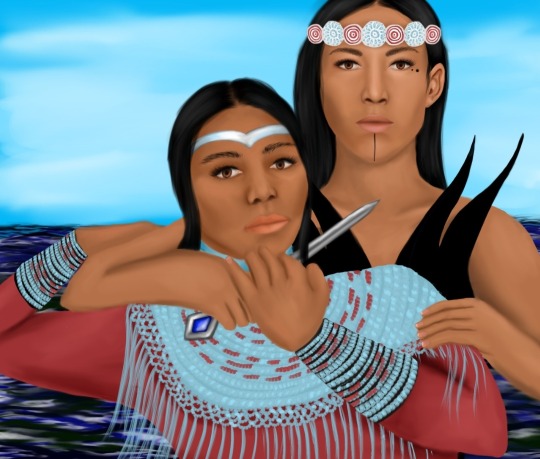

#grishaversebigbang#grishaverse2023#the grisha series#the grisha trilogy#tgt#when water sang fire#ulla morozova#ulla when water sang fire#sankta ursula#silroher#the hedjut
9 notes
·
View notes
Text
Grishaverse fans, I have a question. Is Sankta Ursula supposed to be Ulla, or the human woman she (might’ve) helped live a long life? I know sankts are typically Grisha, but I was confused because of their similar names.
11 notes
·
View notes
Text
#sorry im kinda going freestyle with these polls now#i did have a plan when i started but not anymore#just livin my life#also i love ulla#grishaverse#shadow and bone#my polls#fandom polls#grishaverse polls#languahe of thorns#lives of saints#when water sang fire#fjerda#ulla morozova#sankta ursula of the waves#senje ursula#the darkling#baghra morozova#aleksander morozova#i LOVE the idea of the sildroher#and i hate how its not brought up that they exist
32 notes
·
View notes
Text
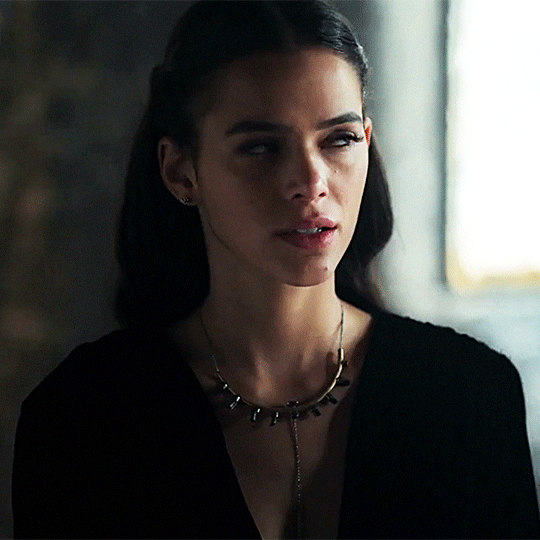

when almost no one talks about you, although you are no less interesting character than your brother
#shadow and bone#shadowandboneedit#grishaverse#grishaverseedit#when water sang fire#ulla morozova#brunamarquezine#brunamarquezineedit#the darkling#alexander morozova#baghra morozova#ulla deserves more attention#I love her so much#ready to start a cult of Sankta Ursula
71 notes
·
View notes
Quote
Ursula, who had clung resolutely to her faith, survived and lived to an old age in a rock cave on one of the islands, eating nothing but the mussels and oysters she collected from the tide pools, and drinking nothing but salt water.
The Lives of Saints (Leigh Bardugo)
worshipper: Are you the Princess Saint?
Ulla, chugging a bucket of seawater: Yes.
#Grishaverse#grishanalyticritical#The Lives of Saints#ch: Sankta Ursula of the Waves#Ulla Morozova#V#books#quotes#Leigh Bardugo
27 notes
·
View notes
Text
personally, since the show makes no sense anymore, i think mal should go, find ulla and bring her back to ravka to cause some havoc.
“hey guys, this is my cousin ulla, you remember darkling? yeah so that’s his sister, sankta ursula, the sea witch, who has vendetta against mermaids. she is gonna stay with us for a while.”
and everyone is like: “sorry mal but your family is so fucking weird, don’t bring in any more of your relatives, we still haven’t properly killed the first one.”
#ulla morozova#mal oretsev#i love this family#fight me#i want that morozova soap opera spin off so bad#shadow and bone
80 notes
·
View notes
Text
Ulla sometimes dreamed of a life in distant waters, of finding other sea folk somewhere who would want her, who would not care what she looked like or who had sired her.
But mostly she dreamed of becoming a court singer— venerated, valued.
...
Ulla thought for a moment of an easy melody, something that would end this humiliation quickly. Then she shoved the thought away. She hated Signy for being so afraid to be paired with her even briefly, hated her classmates for their stifled giggles and sly eyes, but mostly Ulla wished she could kill the thing inside herself that still longed for their approval. [...]
...
"Hungry Ulla," he had taunted. "Why do you work so hard? I can smell your ambition like blood in the water."
Ulla didn’t know why those words shamed her. Song was all she had and so she clung to it, honed and perfected it, as though if she could only sharpen her skill to a fine enough point, she might carve a place for herself in the world.
Beneath the sea, Ulla was an outcast, like her brother and bio mother were outcasts on earth. But while the latter were cast aside through violent means for being born with special abilities, Ulla had to deal with rejection for her appearance through microaggressions: the giggling from her classmates, her mother's barely concealed disgust while brushing her hair, her friendless childhood until Sygny came along. Ulla spent her entire life longing to be truly accepted somewhere by her own kind, and every action she took was in service of that goal. She is similar to Aleksander in the sense that they both see power as a shield against discrimination. But while Aleksander sought power for the collective betterment, Ulla's quest for power was centered on her individual person. Aleksander wanted his people to be treated as human beings, while Ulla wanted to be treated with respect, to not be sneered at for her appearance. And she was only "accepted" into the merfolk when she showed them just how exceptionally powerful she was, and therefore useful for their royal disputes, just like grisha were only partially tolerated in Ravkan society when Aleksander showed them how useful they could be for the otkazat’syas wars.
But they were "not made to please princes" as Aleksander put it, and Ulla eventually came to see the truth of his words. They were born exceptional, and they were hurt and taken advantage of by people in power for their uniqueness. Now both siblings have risen to Sainthood, they became legends associated with devastation. Sankta Ursula of the Waves is the saint who split an island after sinking an entire city beneath the waves, and the Starless Saint is the one who split a country after bathing towns in darkness. This is what resulted of two exceptional individuals who just wanted the world to not hate them for being different.
#cut a morozova and they bleed trauma#ulla morozova#aleksander morozova#the darkling#the language of thorns#when water sang fire#morozova siblings#grishaverse#meta#this has been collecting dust in the drafts for over a year now
66 notes
·
View notes
Text
Grishaverse reference
Hi Grishaverse moots, idk if someone has already done this before and if they have, sorry, guess we've got two cakes now.
I recently finished reading lb's written version of Lives of the Saints and I have many thoughts. The following are my guesses on nation of origin and grisha power for the saints mentioned in the book, based on the stories provided. There isn't a ton of information, but these are my best guesses, feel free to put these interpretations in your fics!
Also lb's grasp on Russian is tenuous at best, so keep in mind that this list is written letter for letter the way the chapters were titled, not the way these names would be properly spelled.
Sankta Margaretha - Kerch, likely Durast
Sanka Anastasia - Ravkan, likely Healer or Alkemi
Sankt Kho - Shu, Durast
Sankta Neyar - Shu, Durast
Sankt Juris of the Sword - presumably Ravkan but he dates back to before Ravka was a country, his story references one of his miracles not his actual story of sainthood so his Grisha designation is unknown, we do know that he's a two-souled Grisha bonded with the Dragon
Sankta Vasilka - probably Ravkan due to her being described as the first firebird, likely a two-souled Grisha with a firebird, maybe a Durast or Squaller
Sankt Nikolai - unclear nationality due to his being on a ship from an unknown port, potentially Ravkan, Squaller, maybe an Alkemi too
Sankta Lizabeth of the Roses - Ravkan, maybe a Durast, maybe a two-souled Grisha with bees, maybe an Alkemi with plants
Sankta Maradi - Zemeni, Tidemaker or Squaller
Sankt Demyan of the Rime - Fjerdan, Durast
Sankta Marya of the Rock - Suli, Durast
Sankt Emerens - Kerch, maybe Alkemi or Heartrender
Sankt Vladimir the Foolish - Ravkan, Tidemaker
Sankt Grigori of the Wood - Ravkan, Healer, potential Durast, two-souled Grisha with a bear
Sankt Valentin - unknown nationality, potential Squaller or Heartrender, potential two-souled Grisha with a snake
Sankt Petyr - Ravkan, potential Inferni or Heartrender
Sankta Yeryin of the Mill - Shu, likely Durast or Alkemi
Sankt Feliks Among the Boughs - Ravkan, likely Alkemi, the Thornwood grew where he died, two-souled Grisha with a hawk
Sankt Lukin the Logical - unknown, potential merzost-using Healer or Heartrender
Sankta Magda - Ravkan, Healer or Alkemi, maybe secondary Squaller gift, saved Grisha children from pyres
Sankt Egmond - Fjerdan, Durast, forced to create the Ice Court
Sankt Ilya in Chains - Ravkan, merzost-using Durast, potential Healer/Heartrender too
Sankta Ursula of the Waves - from an area in Fjerda where she is called a princess but we known her mother is Baghra and her father a sildroher, making her half-sildroher half Ravkan, Tidemaker
Sankt Mattheus - unknown nationality, Alkemi or Heartrender, turned wolves into dogs, possible merzost using Heartrender or two-souled Grisha with a wolf
Sankt Dimitri - unknown nationality, likely a merzost-using Healer or Heartrender (or a Squaller playing a joke due to his? skeleton being found in a room still praying and also talking)
Sankt Gerashim the Misunderstood - likely Ravkan, potential Durast, his vow of silence makes me think it's more likely that he was attacked and made mute because it says he stopped talking at 15 and didn’t say a word in his defense before he died
Sankta Alina of the Fold - Ravkan, Sun Summoner, obviously
The Starless Saint - Ravkan, Shadow Summoner, obviously
Extra thoughts I had reading the book:
“Half of novokribirsk was lost” - this is how the Darkling moving the Fold was described so I guess we have a better grasp on where the Fold moved to and how many people died
The story with Alina isn't about her own sainthood but about people praying to her, specifically Grisha children who are being sold to Kerch slaver, what a surprise that Alina didn't fix everything governing Ravka (I am bitter as hell and this is sarcastic)
Ulla being described as a princess is odd because what is she the princess of?
We know that dragons and sildrohers exist in the grishaverse but nebulous "demons" are also mentioned as taking over people's bodies. It's unclear how real these might be or whether they were trauma responses or mental health issues.
A ton of these people are hermits, likely because it helped hide their powers.
Lots of saints being accused of conspiring with the “demons,” lots of the saints are described as “witches.”
The prose feels like I’m reading propaganda written by the Apparat. ex: All the saints are described as pious and this is what their actions are attributed to despite clearly being the result of Grisha powers.
It's interesting to me personally lb even included Aleksander or allowed a story to exist that showed how his expansion of the Fold benefitted a Ravkan citizen.
Most Saints are described as weak and sickly, wonder why that is (wasting sickness from hiding their powers).
The Tula valley was desolate before the Fold because Feliks died there and many crops rotted after his death.
A lot of these stories have townspeople and noblemen turning on the saints, also lots of stories of people fighting for royalty then being betrayed by the same royalty (what a sucky trend for Grisha).
Many saints are said to be monks and scholars, this might be Apparat propaganda but it also might be an extension of them being in hiding about their powers.
Lot of saints are Durasts and Alkemi, likely because Materialki powers are the easiest to hide. Possible Etherealki Saints probably didn't survive long enough to be remembered.
A surprising amount of saints were Squallers. This may be because wind is harder to predict than other natural forces and is more likely to be dismissed as nature rather than Grisha power.
Only one saint is a potential Inferni. Probably because it's arguably the most difficult power to hide.
Some of these legends definitely seem older than others because they reference each other and lb does not make it clear where in the historical timeline they fall in relation to each other.
Some of the saints are only described with their miracles not their stories of sainthood, this is a curious choice and I wonder why it was made.
Some of the saints' deaths are written as fade to black while others are described in excruciating detail. Another weird choice.
#ref#grishaverse#grishaverse ref#fic ref#shadow and bone#sab#s&b#aleksander morozova#alina starkov#ilya morozova
5 notes
·
View notes
Text
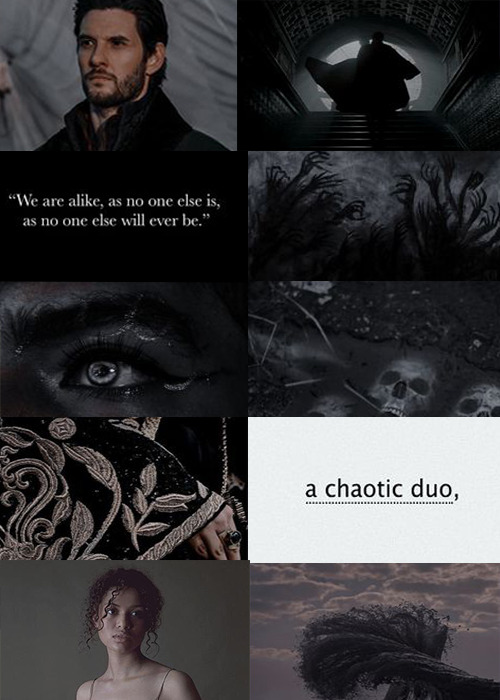
"Why did you come looking for me? After all this time.”
“Family is all we have.”
“Is that why you keep our mother in a cage?”
Aleksander & Ulla Morozova, Blood of the Bonesmith. The Heretic and Songstress
dialogue by @shakespearedidnothavecumsh0ts
#aleksander morozova#ulla morozova#fc: gugu mbatha raw#morozova family#shadow and bone#grishaverse#bookverse#leigh bardugo#the darkling#grishaverseedit#sankta ursula#ullamorozovaedit#the black heretic#aleksandermorozovaedit
21 notes
·
View notes
Text
I'm reading The Lives of Saints right now and it was pretty much confirmed in King of Scars and Rule of Wolves that most, if not all Saints of the Grishaverse were Grisha, so now I'll list them and tell you what order I think they were in. Also Spoilers for the Grishaverse
- Sankta Margaretha: Durast because she works with solid materials like metal and gem stones
- Sankta Anastasia: Healer because her blood healing people is pretty obvious
- Sankt Kho: Tailor because he works with solid materials like metal (which is a Durast thing) thing but also with flesh and bones (which is a Corporalki thing especially a Corpse witch thing) and Genya explains at some point in the first book that a Tailors powers are kind of in between those two
- Sankta Neyar: Durast because she is the Saint of the black smiths and made her own sword
- Sankt Juris: a confirmed Etherealnik, his animal is the dragon
- Sankta Vasilka: Fabrikator because she works with threads and colours (btw I'm convinced that Leigh chose this name cause it's got "silk" in it, you know like a pun), her animal is the firebird
- Sankt Nikolai: I acutally have no clue (maybe an Alkemi???) even though it seems like this little boy didn't do the wonder himself he deserves to be a Saint because he is so nice to everyone and wants to share with the people also I think his animal is definitely the reindeer
- Sankta Lizabeta: a confirmed Fabrikator, her animals are the bees (btw I'm disappointed that we didn't get a picture of her like the one described in the Grisha trilogy you know where that bitch is brutally quartered)
- Sankta Maradi: Etherealnik most likely a Squaller
- Sankt Demyan: Fabrikator most likely a Durast
- Sankta Marya: Durast because she manipulates solid materials (rocks)
- Sankt Emerens: no clue (maybe a Fabrikator???), his animals were most likely the rats. Damn he deserved better than drowning in grain because he wanted to do something good like that's such a cruel death and then they didn't even bury him in the cemetery
- Sankt Vladimir: Tidemaker because my boy is holding back the ocean all alone for a whole month
- Sankt Grigori: confirmed Corporalnik Healer, his animal is the bear
- Sankt Valentin: powers no clue, animal is a snake, the book doesn't tell how he became a Saint and I'm curious but it told us a wonder he did just like in the Juris chapter but there the "defeating the dragon made him a Saint" was at least mentioned
- Sankt Petyr: powers no clue, I don't think the demon could be his animal
- Sankta Yeryin: Fabrikator because maybe she used her powers to move millstones to make the flour
- Sankt Feliks: most likely a Materialnik like the monks in the end of RoW, animal is the falcon
- Sankt Lukin: I'd guess Corporalnik because he survives something he shouldn't and because making people sleep before they die is a very heartrender thing
- Sankta Magda: the birth help and the suddenly looks younger part sound Healer-like but the healing potions and elixars and whatever sound more like a Alchemi thing so it's gotta be one of those
- Sankt Egmond: Durast, he works with stone, metal, glass etc can it be more obvious?
- Sankt Ilya: he is Morozova, the Bone Smith, a Fabrikator who used Mezost, even though he created the 3 Amplifiers those never were his animals but Alinas
- Sankta Ursula: Etherealnik, Tidemaker the wave was pretty obvious
- Sankt Mattheus: no clue, he just tamed wolves, so I guess they'd be his animals
- Sankt Dimitri: no clue
- Sankt Gerasim: Fabrikator most likely an Alchemi, because he works with paint and powders
- Sankta Alina: confirmed Sun Summoner, her animals are the stag, the sea whip and Mal I guess
- Starless Saint: confirmed Shadow Summoner
#grishaverse#lives of saints#the lives of saints#sankt grigori#sankta lizabeta#sankt juris#sankta alina#shadow and bone#alina starkov#the starless saint#the darkling
32 notes
·
View notes
Text
https://archiveofourown.org/works/50915779
My fic for the GVBB 2023! I wanted to do Ulla justice!
The art on the right is by @punchsomeoneforme-willyou
The art on the left is by @aramy-studio
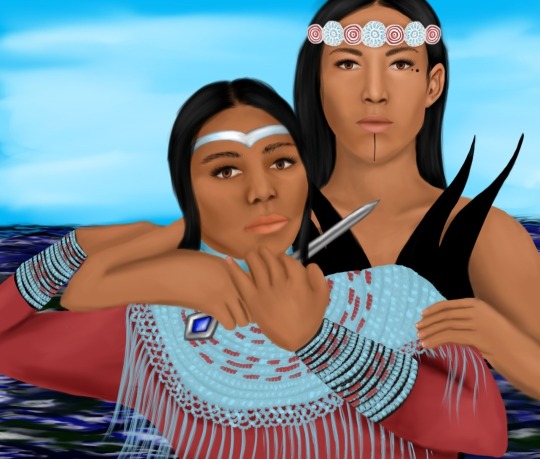

#grishaversebigbang#grishaverse2023#the grisha series#the grisha trilogy#tgt#when water sang fire#ulla morozova#ulla when water sang fire#sankta ursula#silroher#the hedjut
0 notes
Text
The Lives of Saints part 5
SANKTA MAGDA
Oh hey, this is the Magda from The Witch of Duva! That actually makes sense, the fairy tale doubling as a story about a saint, and it gives the tale more dimension when it’s supposed to be clear that the “witch” is actually a saint.
She’s even the saint of abandoned women.
SANKT EGMOND
This is also a story we head a lot about in the main series, and the “answer” seemed to be that the building was done by several Grisha. Really makes you remember that the stories can be really exaggerated if they have any relationship with the reality at all.
SANKT ILYA IN CHAINS
Nothing new here, compared to what we’ve seen about Ilya’s life. This might be the story that’s closest to what actually happened from any of the stories where we know the truth thus far.
SANKTA URSULA OF THE WAVES
There’s a clear relation to Ulla in When Water Sang Fire, although almost everything is different. But the name and water are the key things.
If this was from a real mythology I would expect that the story of Ulla came first, and Ursula was modified from that. The saint worshipping religion seems like the kind that eats other mythologies the same way Christianity does.
SANKT MATTHEUS
Okay, dog domestication happened fifteen hundred years ago, so this story is definitely bunk. But it is possible that a place had feral dogs that were easily re-domesticated by someone. There isn’t even any Grisha powers needed.
0 notes